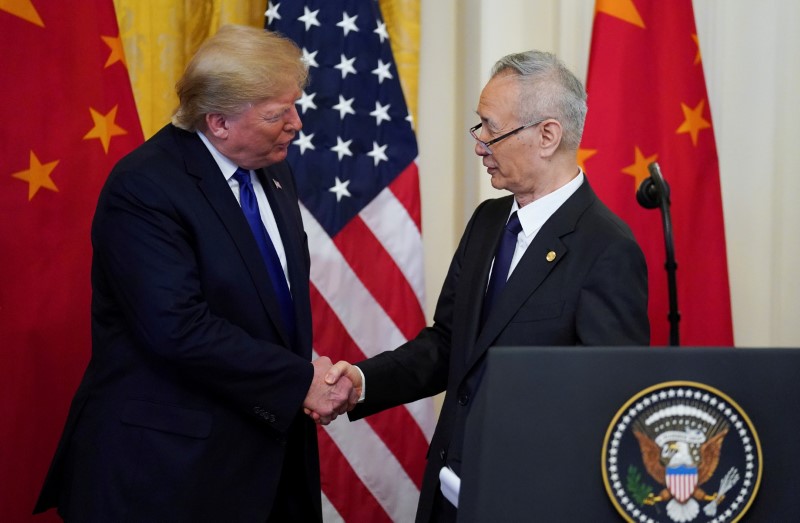By Michelle Price and Sumeet Chatterjee
WASHINGTON/HONG KONG (Reuters) - The long-awaited U.S.-China trade deal touted wins for U.S. companies looking to access China's $40 trillion financial sector, but many of the changes were already in the works, with Beijing having stepped up the pace of liberalization last year.
Under the deal, China has agreed to move forward by nine months a December 2020 deadline for removing foreign ownership caps on securities firms, which includes investment banking, underwriting and brokerage operations.
The Phase 1 trade deal, signed by U.S. President Donald Trump on Wednesday, promises improved access to Chinese markets in banking, insurance, asset management, payments and fund management.
It aims to address a number of longstanding U.S. complaints about barriers to investment in China's financial sector, including foreign equity ownership restrictions, discriminatory regulatory requirements, and opaque licensing processes.
"China is very eager to get more private funds to invest in the economy", to help fuel economic growth, said Andrew Collier, managing director of Hong Kong-based Orient Capital Research. But foreign companies will struggle to corner a bigger share of the market from state-owned and private Chinese rivals, he said.
The deal text said that by no later than April 1, China will remove foreign equity limits and allow U.S. investment banks to participate in local securities businesses.
Foreign banks' ownership cap in China securities joint ventures was lifted to 51% in 2018 from 49%. Lack of control and limited contribution to revenue have long been a source of frustration for global investment banks.
While Goldman Sachs (N:GS) and Morgan Stanley (N:MS) are awaiting regulatory nods to raise their holdings to 51% in their China securities ventures, Citigroup (N:C) plans to set up a wholly-owned securities business after agreeing last year to sell its stake in its previous joint venture.
JPMorgan (N:JPM) got final approval from regulators on Dec. 18 to set up a majority-owned securities venture.
As well as the headline initiatives, the agreement also goes into granular detail on a number of areas, and as a result "feels more concrete than previous announcements," said Jane Jiang, a Shanghai-based partner at Allen & Overy.
"There are parts that seem to be written with specific companies in mind, and so we are almost certain that there will be takers for those openings as they must have lobbied for them," Jiang said. She cited as an example an adjustment to rules about foreign banks buying Chinese non-performing loans.
China has said the Phase 1 deal will boost imports of U.S. financial services. But a pledge to scrap foreign equity limits on firms operating in China's fund management, futures and insurance sectors will feel familiar to many.
"China has already been opening up its markets," said a Beijing-based lawyer, who works with Chinese regulators.
"The real test will be how quickly the applications and regulatory processes are handled."
Last July, Premier Li Keqiang announced China would expedite by a full year its plans to allow 100% foreign ownership in a raft of financial sectors.
Foreign ownership limits in futures companies were scrapped this month, while China said last year that it would do the same for mutual funds by April 2020. A 51% cap on ownership in life insurance ventures was also removed this month.
Likewise, China's pledge on Wednesday to open up its payments system to U.S. firms comes after its central bank said it had accepted an application from an American Express Co (N:AXP) unit regarding starting onshore operations.
Ken Bentsen, CEO of the Securities Industry and Financial Markets Association, which has criticized China for failing to make good on past promises to level the playing field, struck a cautious note on Wednesday's deal.

"We will examine this agreement closely including what it specifically means for our members in terms of its implementation and enforcement," he said in a statement.